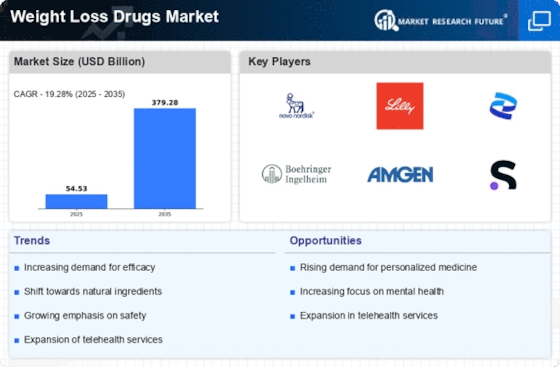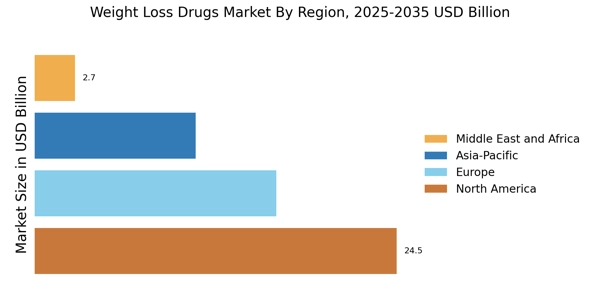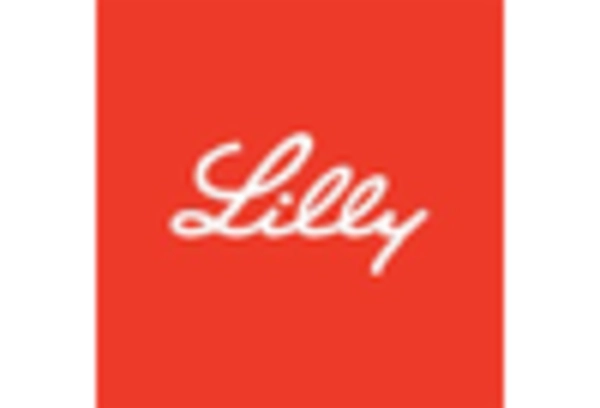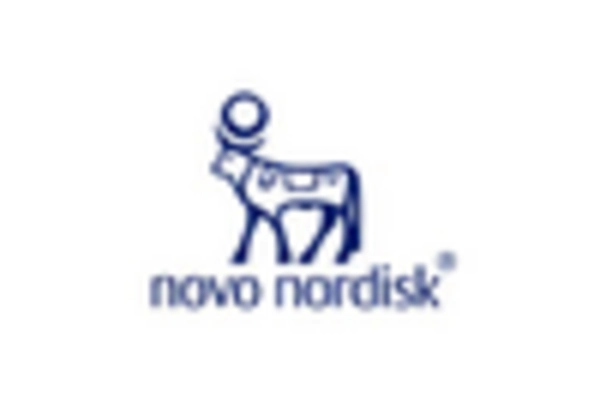Increasing Obesity Rates
The escalating prevalence of obesity is a primary driver for the Weight Loss Drugs Market. According to recent statistics, approximately 42% of adults in certain regions are classified as obese, which has prompted a surge in demand for effective weight loss solutions. This alarming trend is likely to continue, as lifestyle changes and dietary habits contribute to weight gain. Consequently, pharmaceutical companies are investing heavily in research and development to create innovative weight loss drugs that cater to this growing demographic. The increasing awareness of obesity-related health risks, such as diabetes and cardiovascular diseases, further fuels the demand for weight loss medications, thereby propelling the Weight Loss Drugs Market forward.
Growing Health Consciousness
There is a notable increase in health consciousness among consumers, which is driving the Weight Loss Drugs Market. Individuals are becoming more aware of the health implications associated with obesity and are actively seeking solutions to manage their weight. This shift in mindset is leading to a higher acceptance of weight loss drugs as a viable option for achieving weight management goals. Furthermore, the proliferation of health information through digital platforms has empowered consumers to make informed decisions regarding their health. As a result, the demand for weight loss medications is likely to rise, contributing to the overall growth of the Weight Loss Drugs Market.
Advancements in Drug Development
Recent advancements in drug development technologies are significantly influencing the Weight Loss Drugs Market. The emergence of novel compounds and targeted therapies has led to the introduction of more effective weight loss medications. For instance, drugs that target specific metabolic pathways are showing promise in clinical trials, potentially offering better results with fewer side effects. The market is witnessing a shift towards more personalized approaches, where treatments are tailored to individual patient profiles. This trend not only enhances the efficacy of weight loss drugs but also increases patient adherence to treatment regimens. As a result, the Weight Loss Drugs Market is expected to expand as new and innovative products enter the market.
Regulatory Support for Weight Loss Medications
Regulatory bodies are increasingly supportive of the development and approval of weight loss medications, which is positively impacting the Weight Loss Drugs Market. Recent initiatives aimed at expediting the approval process for new weight loss drugs have encouraged pharmaceutical companies to invest in research and development. This regulatory environment fosters innovation and allows for the introduction of new therapies that meet the needs of consumers. Additionally, the approval of new drugs often comes with marketing incentives, further stimulating competition within the Weight Loss Drugs Market. As a result, the landscape for weight loss medications is evolving, with more options becoming available to consumers.
Rising Demand for Non-Surgical Weight Loss Solutions
The increasing preference for non-surgical weight loss solutions is a significant driver of the Weight Loss Drugs Market. Many individuals are seeking alternatives to invasive surgical procedures, which can be costly and carry inherent risks. Weight loss drugs offer a less invasive option for those looking to manage their weight effectively. The convenience and accessibility of these medications appeal to a broad audience, including those who may be hesitant to undergo surgery. As awareness of the benefits of non-surgical options continues to grow, the demand for weight loss drugs is expected to rise, thereby enhancing the overall dynamics of the Weight Loss Drugs Market.

















